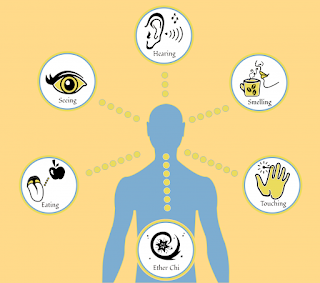Welcome to our Smells and Bells Spring 2020 Blog
Web Blog Sensory Interpretation Blog Prompt
 |
| or 6? |
Sensory Interpretation Web Blog Posts (6 posts on each of the senses, 5% each, plus one summarizing blog post the last week of class 10%, for a total of 40%). Short reflection writing assignments to be posted on a blog set up specifically for this class here. Students will "log" what they are learning about the relationship between the senses and "religious" experience throughout the term, and be able to comment on one another's questions and insights. You should make at least 7 posts, @one every two weeks. Make sure you have one post each tagged with "taste", "smell", "hearing", "sight", "touch" or "6th sense." To assure you will get credit for covering each of the six senses in your blog posts, edit them to make sure they have these tags.
Also among your 7 or more posts you should respond specifically to each of the required books (even if it's as a starting point to make your own point), namely,
- Diane Ackerman, Natural History of the Senses, Vintage, 1990)
- Constance Classen, The Deepest Sense: A Cultural History of Touch (U. Illinois, 2012)
- Deborah Green, The Aroma of Righteousness: Scent and Seduction in Rabbinic Life and Literature (Penn State, 2011)
- Elizabeth Pérez Religion in the Kitchen : Cooking, Talking, and the Making of Black Atlantic Traditions (2016) and Rachel Fulton, “ ‘Taste and See that the Lord is Sweet’ (Ps. 33:9): The Flavor of God in the Monastic West.”
- Diana Eck, Darsan: Seeing the Divine Image in India
- Anne Rasmussen, Women, The Recited Qur’an, and Islamic Music in Indonesia (U. California, 2010)
- David Abram, The Spell of the Sensuous: Perception and Language in a More Than Human World (Vintage, 1997)
Likewise, tag the post that mention these authors with their last name, e.g., "Perez", "Eck", "Abram".
***In your posts, use images or sounds as well as words to convey your points! Finally, you must contribute at least ten comments to any of your fellow students' blog posts during the course of the term. These are both for your own benefit - to get you to begin to think analytically, to focus your thoughts on what you're learning, and for the class as a whole - to stimulate class discussions. (Preparation of the readings and class participation will be evaluated primarily on the basis of your contributions to our blog, and count for 40% [!] of the course grade.)


Comments
Post a Comment